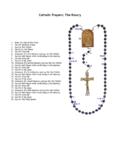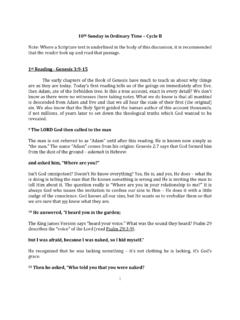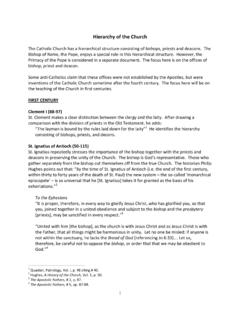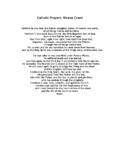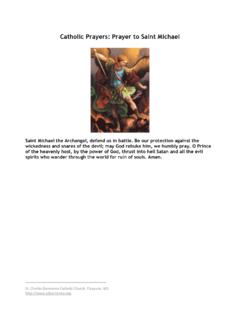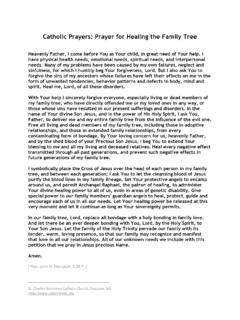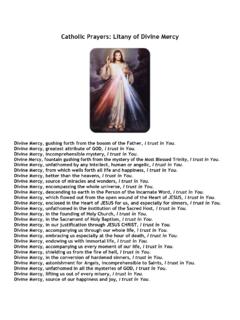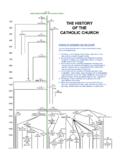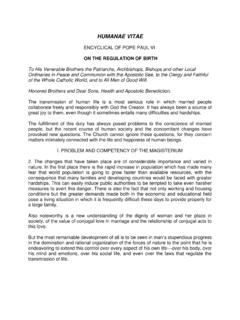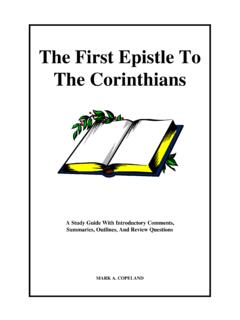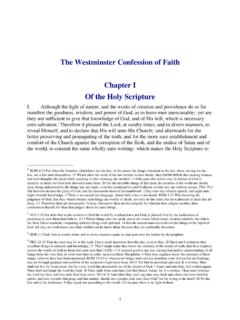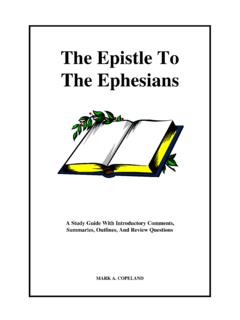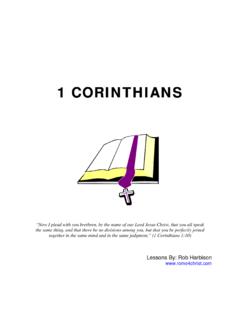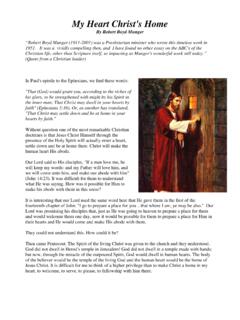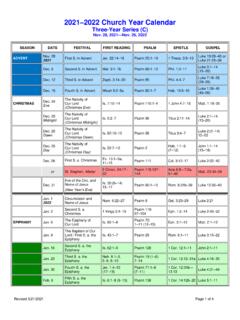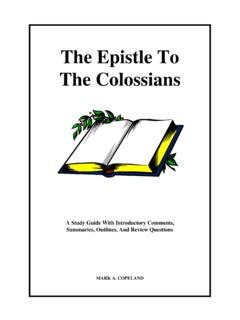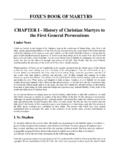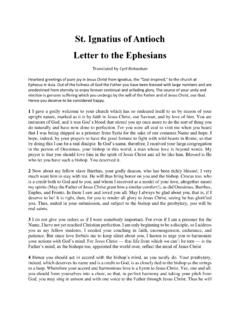Transcription of 5th Sunday in Ordinary Time - Cycle C
1 5th Sunday in Ordinary Time Cycle C. Note: Where a Scripture text is underlined in the body of this discussion, it is recommended that the reader look up and read that passage. 1st Reading - Isaiah 6:1-2a, 3-8. Last week we heard Jeremiah's call to prophetic office which was in the form of a dialog between Yahweh and Jeremiah. Today's reading describes Isaiah's call to prophetic office in 742 , 116 years before Jeremiah's call. Isaiah, according to Jewish tradition, was of royal stock. It is certain that he belongs to the tribe of Judah and that his home was in Jerusalem. Unlike Jeremiah, who was celibate, Isaiah was married and had two sons. From the time of his calling, Isaiah's whole life was devoted to the Lord Yahweh.. The Lord had called him and henceforth Isaiah was His servant. There was only one law in the world for him the will of Yahweh. Yahweh is the holy one, the Almighty, whose glory fills heaven and earth, who made the world according to His plan, and governs and directs it according to His will.
2 He works all things, even when His works appear strange and unintelligible to man. The name Isaiah means Yahweh is salvation.. Jeremiah's call to office was in the form of a dialog between Yahweh and Jeremiah;. Isaiah's is a majestic vision. 6:1 In the year King Uzziah died, King Uzziah died in 742 after a reign of over 40 years. His death brought to an end a period of great prosperity and security. Assyria once again set out on the path of conquest. During Isaiah's lifetime Assyria would occupy the Northern Kingdom and invade Judah. It is possible that Uzziah is mentioned here to point out man's mentality and how temporary our well being is in comparison to God's eternal glory. I saw the Lord seated on a high and lofty throne, Yahweh is depicted as a king. with the train of his garment filling the temple. The Temple in Jerusalem, built by Solomon 200 years earlier and destroyed by the Babylonians in 587 ; 155 years after this vision.
3 2a Seraphim were stationed above. 1. The name seraphim means the burning ones. They are angels of the highest rank of the nine choirs of angels; the ones closest to God and His fiery love. Omitted from our reading today is Isaiah's description of these seraphim: each of them had six wings: with two they veiled their faces [Out of reverence (Exodus 3:6; 1 Kings 19:13)], with two they veiled their feet [a euphemism for sexual parts], and with two they hovered aloft.. 3 Holy, holy, holy is the LORD of hosts! they cried one to the other. The Hebrew language has no modifiers, the word is repeated to achieve this effect. holy, holy, holy equals holy, holier, holiest. In the opinion of many scholars, the Hebrew root has the basic meaning of separate, not dependent on others. In Old Testament usage holiness is primarily neither a physical nor a moral quality but an attribute which combines both.
4 All the earth This king, God, is not a national king like Uzziah; His kingdom is the entire earth. is filled with his glory! . Glory is importance, power, might. The earth was created by His glory. 4At the sound of that cry, the frame of the door shook and the house was filled with smoke. A sign of divine presence, the smoke is the same glory cloud which filled the tabernacle during the wandering in the desert (Exodus 40:34). 5 Then I said, Woe is me, I am doomed! Could a man see God and live? Exodus 33:20 says but my face you cannot see, for no man sees me and still lives. Isaiah was overwhelmed by a sense of his own unworthiness, especially since he was one with a sinful people. This whole verse gets its force from the unalterable opposition between God and sin. For I am a man of unclean lips, living among a people of unclean lips; yet my eyes have seen the King, the LORD of hosts!
5 6 Then one of the seraphim flew to me, holding an ember which he had taken with tongs from the altar. 7 He touched my mouth with it. See, he said, now that this has touched your lips, your wickedness is removed, your sin purged.. This symbolic act of purification was the result of God's, not man's initiative. 2. 8 Then I heard the voice of the Lord saying, Whom shall I send? Who will go for us? . The context supposes that a session of Yahweh's council has just concluded (see 1 Kings 22:19-23). A messenger is sought to carry news of the decision which has been made. The Hebrews conceived of Yahweh enthroned above the firmament and holding court with his heavenly advisors (angels). In this scene, the seraphim are members of the assembly who are consulted about the decrees concerning the government of the world. However, they do not make the decisions; their function is to adore. Yahweh's decision is final and absolute.
6 Here I am, I said; send me! . Isaiah is eager to serve God. 2nd Reading - 1 Corinthians 15:1-11. For the past two weeks we have heard the Christian community (the Church). compared to the human body and we have heard of the gifts of the Holy Spirit. In both instances it was made clear that no one individual or gift is more important than another as all are there to serve the common good. However, of the theological virtues of faith, hope and love, love (charity) is the most important and all can possess it. Chapter 14 of 1. Corinthians, which we skip over to get to today's reading, talks about the relative value of the gifts of prophecy, tongues, interpreting tongues, etc., and ends with the direction that the gifts are to be used for the edification of the Church. As we learned three weeks ago (2nd Sunday in Ordinary Time, Cycle C), Paul wrote this letter to answer things which were worrying the Corinthians.
7 Today he treats the subject of the resurrection of the body. A characteristic Greek and Platonic concept was that the body was a hindrance to the soul's activity. St. Paul answers this question by declaring that the bodily resurrection of Christ is a fact duly attested to by chosen witnesses. 15:1 Now I am reminding you, brothers [and sisters], The job of the Church is to remind us of the truths of our faith. of the gospel I preached to you, which you indeed received and in which you also stand. The basis of Paul's response is the church's belief in the resurrection of Jesus. Since He really rose from the dead, resurrection is no longer a theory but a demonstrated fact. 2 Through it you are also being saved, 3. An ongoing process. The theme of 1st Corinthians is that salvation comes through the cross (1 Corinthians 1:18). if you hold fast to the word I preached to you, unless you believed in vain.
8 Not as you want to understand it, but as it was preached. This is why tradition is so important; to see how the understanding has always been. The Corinthians did not need to learn the doctrine, which they already knew, but they had to be reminded of it and corrected from their errors in understanding it. [Saint John Chrysostom (ca. 392), Homilies on the first epistle to the Corinthians 38,2]. 3 For I handed on to you as of first importance what I also received: that Christ died for our sins His death was the sin offering which opened heaven and allowed our sins to be forgiven and forgotten. From the time of the golden calf until the crucifixion of Jesus, offerings were made repeatedly but sins were not forgotten. The offerings were ineffectual because the sin of the golden calf had not been forgotten. in accordance with the scriptures;. The interpretation of Jesus' death in terms of Isaiah 53:5 may go back to Jesus Himself (see also Luke 20:37; Acts 8:32-35; 1 Peter 2:22-25).
9 How could Christ have died for sinners if He Himself were in sin? Anyone who would die on behalf of sinners ought himself be without sin; because if he too does commit sin, how shall he die for other sinners? And if Christ died for the sins of others, He died without having been a sinner Himself. [Saint John Chrysostom (ca. 392), Homilies on the first epistle to the Corinthians 38,2]. 4 that he was buried;. This guarantees the reality of His death. that he was raised on the third day in accordance with the scriptures;. For the resurrection, the Apostles appealed to Psalm 16:8-11 (see Acts 2:25-28; 13:34-35). Perhaps Paul also has in mind Jonah 2:1 (Matthew 12:39-40) and/or Hosea 6:2. Jewish tradition considered the third day to be the day of salvation (Genesis 22:4-5). Also, God completes forming the world on the third day (Genesis 1:13) and filling it on the sixth (the second third ) day (Genesis 1:31).
10 What we have here in verses 3 and 4, called by St. Paul the gospel (good news) is the creed of the Church: 4. Christ died for us. He was buried. He rose on the third day. 5 that he appeared This description shows that the appearance was on the initiative of Jesus and not a chance sighting by those named. to Kephas, then to the Twelve. The order of appearance is first to the Chief Apostle, then the 12 Apostles (the chosen witnesses), then to 500 brothers. Paul omits the apparitions to the holy women, mentioning only those persons which Jewish law would accept as responsible witnesses. Evidently Matthias was chosen to replace Judas before Jesus ceased appearing to the disciples after His resurrection. [Origin (after 244), Commentary on 1 Corinthians 4,77]. 6 After that, he appeared to more than five hundred brothers at once, most of whom are still living, This means that they are available for questioning.
